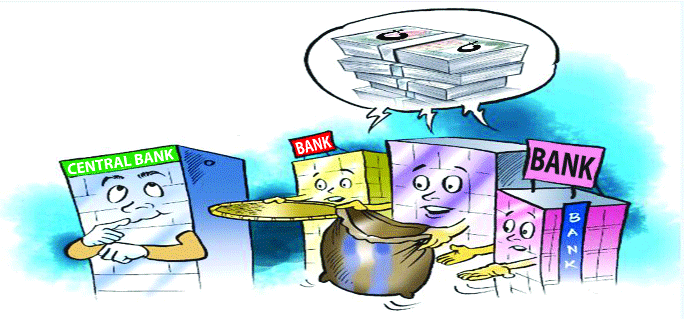Banks facing acute liquidity crisis ahead of Eid-ul-Fitr
Mahfuja Mukul: Ahead of the upcoming Eid-ul-Fitr, there is a severe liquidity crisis in commercial banks. The pressure to withdraw cash from the bank has increased. Banks in crisis have borrowed record amounts to deal with the crisis. The amount of which is Tk 32 thousand crores. Out of this, about Tk 29 thousand crore have been borrowed from the central bank under special liquidity support and about 3 thousand crore rupees have been borrowed from call moneymarket and commercial banks. Earlier, there is a precedent of borrowing a maximum of Tk 26 thousand crores from the central bank in one day.
Loans are increasing more than deposits in banks in recent times. Besides, to deal with the dollar crisis, dollars have to be bought with cash from the central bank. At the same time, the money taken against the central bank by lending dollars now has to be returned.
The central bank is borrowing dollars from commercial banks to increase reserves. Commercial banks are lending money with these dollars.
Again, the dollar is returned by the central bank after a certain period of time. As a result, when the dollar is returned, the money has to be returned as well. Due to these reasons, liquidity pressure has increased in banks. Demand for cash in banks has also increased due to fasting and Eid.
Money is coming out of the market against dollar selling. Against the sale of about $10 billion so far in the current financial year, more than Tk 1 lakh crore have come to the central bank. Again, most of the government’s loan demand is being taken from banks.
On Wednesday, commercial banks borrowed Tk 28,867 crore from the central bank under special liquidity support, marking the highest borrowing in a single day. Earlier last year, maximum Tk 26 thousand crore were borrowed from central bank in one day. Besides, Tk 20,000 to Tk 22,000 crores are being borrowed. However, Tk 12 to Tk 18 thousand crores are often borrowed. A large part of these loans are taken for one day. The remaining part is taken for 7 days or 15 days period. After the fixed period of borrowing, the banks faced liquidity crisis again while returning the money. Then again borrowing from the central bank. In this way the banks are now conducting their daily operations.
Apart from Bangladesh Bank, one bank is also borrowing from another bank. These include loans, short and long term loans. On Wednesday, the banks have taken about Tk 3,748 crore in cash, short and long term loans. Out of this, the amount of borrowing at an average interest rate of 8.77 percent in one-day term loans was Tk 2,923 crores. And the remaining money has been taken from four days to 182 days. Banks have taken this money at a maximum of 11.25 percent interest from 9.5 percent. On that day, the central bank and commercial banks borrowed about Tk 32 thousand crore. Monday took Tk 18,600 crore, Sunday took Tk 11,100 crore. In the last 3 days of the last week, on an average, the banks borrowed from Tk 15 thousand to a maximum of Tk 215 thousand crores. Most of the banks are keeping the statutory deposits of the central bank besides meeting the customer demand with this borrowed money. Apart from this, call market also borrowed from the market. In the last 3 days of that week, the banks borrowed about Tk 64,200 crores.
On Thursday, commercial banks borrowed Tk 2,500 crore from the call money market. Apart from this, one bank borrowed Tk 1,200 crores from another bank for short and long term. Tk 3,700 crores have been borrowed from this sector.
According to the data of Bangladesh Bank, the interest rate of treasury bills and bonds has increased rapidly and has now reached the highest level in the last decade. Smart stood at 9.61 percent this month. By adding 3 and a half percent to this, the maximum interest rate at the customer level has reached 13.11 percent. Last June where the highest interest rate was 9 percent.
The bankers said that mainly due to some reasons, the money crisis is becoming evident in the banks. Among them, after the list of banks in red zone and yellow zone was published, the withdrawal rate from some banks has increased. To deal with this situation, banks have to meet their daily expenses with high interest deposits.
Rare Israeli airstrike in Beirut kills Hezbollah commander and more than a dozen others
International Desk: Israel launched a rare airstrike that killed a senior Hezbollah milita…








